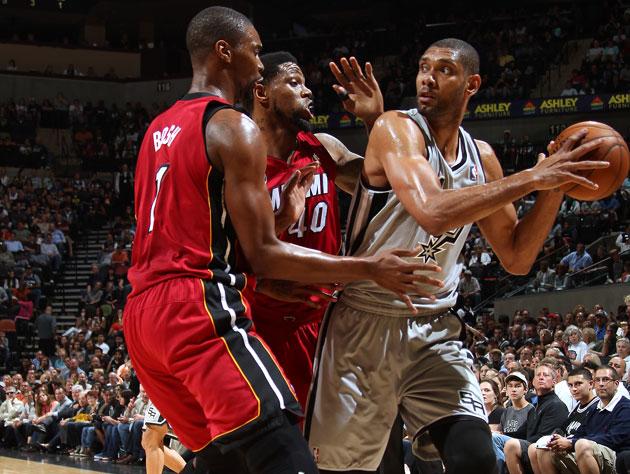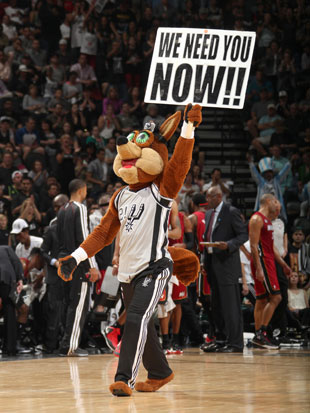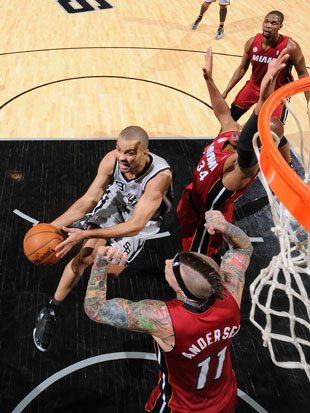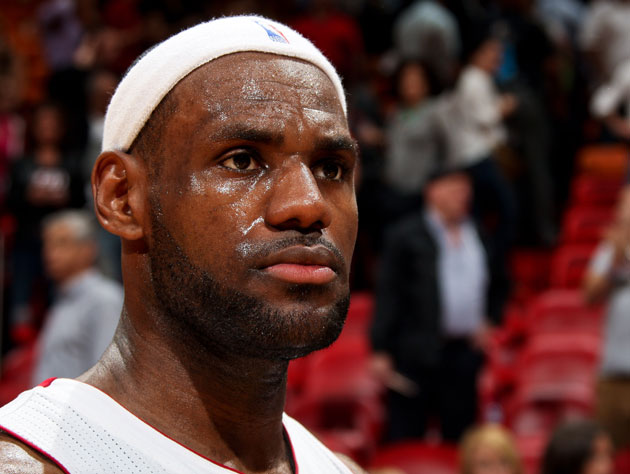
The minds behind Ball Don’t Lie have previewed the NBA Finals, with Kelly Dwyer going against character for a more genial take, Dan Devine bringing his inimitable mixture of both order and bedlam, along with Eric Freeman’s legendary look inside the reputations of some of the series’ key fixtures.
We end the 2012-13 season, single tear, with the Miami Heat and San Antonio Spurs.
Which team do you think will win the series, and in how many games? Vote here to let us know what you think.
Kelly Dwyer’s Guide Vocal
Standing in the batter’s circle while waiting on deck to go up to the plate is a crucial part of a ballplayer’s routine. They’ve been stuck in the dugout a goodly chunk of their in-game experience prior to that practice, chowing down huge gobs of sunflower seeds (or worse) while watching the game (sometimes) from behind a chain link fence designed to defend from incoming foul balls. The on deck portion is integral – not only does it allow the ballplayer to scan the crowd for potential dates for that night, but it rights the rhythm, allows the batter to gauge the varying speeds of the pitcher, while giving the player a chance to warm up with two bats at once.
After nine games of nonsense against the Milwaukee Bucks and Chicago Bulls, the Indiana Pacers served as Miami’s long, stressful , two-bats-one-swing exercise. Seven games of toughening up. It’s Miami’s turn at plate, against San Antonio in these Finals, and they’re only allowed to take one bat up to the box. That’s a good thing for Miami, because after dealing with the weight of swinging two at once against Indiana, a upcoming pair of home games against the Spurs are going to feel like the lightest thing in the world.
This isn’t a dismissal of San Antonio, nor a feeling that can last for up to two weeks in a seven game series. It has to be noted, though, that passing and eventually scoring angles will show up out of nowhere for these Miami Heat. There will be room at the rim, and there will be different defenders to work through – some will be slower, some won’t be as bulky, some won’t be as pesky, and some won’t be nearly as tall and long as Indiana Pacers defensive marvel Roy Hibbert.
Miami won’t ease into this series, as they’ll be working at top seed just three days after taking down the Pacers to end the Eastern Conference finals. San Antonio, infamously, has had nine full days off between Thursday’s Game 1 and the May 27 end of the Western Conference finals win over the Memphis Grizzlies. There have been winning examples of teams coming off of long layoffs to start the Finals before, and those teams were usually working from home, and usually heavily favored. This trip will be different for San Antonio -- even if they pegged Miami as their likely combatant all along, and spent 90 percent of the team’s post-Memphis research and planning prepping for the defending champs.
Such prep probably dates back to last summer. These Spurs have always had Finals aspirations, and the defending champs have always been the favorite out of the East. This is why, after being able to glide into lay-ins and use that strength and quickness to gather good looks offensively, the Heat are in for a potential horror show defensive if they don’t have their wits about them.
 It may take all of Game 1 and most of Game 2 to return to top gear, but once the Spurs start rolling with their various mis-directions and floor-tilting sets, the Heat are going to have a terrible time trying to keep up with a team that doesn’t settle. As we saw in Game 7 of the Eastern finals, the Heat still have the temerity and quickness to turn itself into a fearsome defensive outfit, but San Antonio will show up with options unseen against a Pacer team that went with a strict pick and roll attack.
It may take all of Game 1 and most of Game 2 to return to top gear, but once the Spurs start rolling with their various mis-directions and floor-tilting sets, the Heat are going to have a terrible time trying to keep up with a team that doesn’t settle. As we saw in Game 7 of the Eastern finals, the Heat still have the temerity and quickness to turn itself into a fearsome defensive outfit, but San Antonio will show up with options unseen against a Pacer team that went with a strict pick and roll attack.
This is mostly dependent on Tony Parker’s health (he says he’s past a calf injury suffered in the second round), TP’s rhythm and sightlines after the layoff, and the finishing abilities of the San Antonio role players. If workers like George Hill, Kawhi Leonard, Boris Diaw and Tiago Splitter can either spray from outside the arc or finish around the rim, Miami will have its work cut out for them. Even if the role players merely show up at home, Miami will still probably be facing a seven game series.
Which leads us to our final question about this Heat team. A team that has only been severely challenged once, in a way that would present a lasting and disastrous result, since January. Miami has it in them to do exactly what these San Antonio Spurs did against the Memphis Grizzlies – feed off of momentum at home, and win a series of close games on its way to a four-game sweep that was much tougher than the “four-game sweep” would imply. If the Heat are left with shrugged shoulders after a “they did what they had to do”-type loss, than this could go the distance.
Only two teams have won all three games at home, in a row, in the NBA Finals, and the Heat have yet to lose three games in a row after a regular and postseason that has seen the team run up a 78-20 record. The San Antonio Spurs, because of their killer mix of talent, know-how, and love of new medicine, have what it takes to pull that rarity off.
And the Heat has what it takes to dismiss San Antonio before it even gets to a Game 5. We’re betting on the former option.
PREDICTION: Heat in 7.
Contribute to the Chaos with Dan Devine
For as much as we try to study and analyze every aspect of NBA life these days, in every playoff series, there are unpredictable elements – a player, a tendency, a set, a decision, etc. – that can tilt a moment on its ear, change the complexion of a game or even determine the outcome of a series. For each matchup during this postseason, Dan Devine will look for those X-factors most likely to wreak havoc over the next seven games.
(The phrase "Contribute to the chaos” comes from the song “Twin Size Mattress” by the band The Front Bottoms, which Dan likes a lot.)
Miami Heat: Whether Mario Chalmers and Norris Cole can slow Tony Parker.
On one hand, the Heat’s point guard tandem seems well equipped to match up with Parker, given their speed, quickness, length and athleticism. On the other, we just watched Parker flambé two fast, quick, long-armed, athletic and, frankly, better defenders: Mike Conley and Tony Allen.
Parker took those Memphis Grizzlies to the woodshed, scoring 24.5 points per game on 53.2 percent shooting while dropping 9.5 assists a night in the Spurs’ four-game Western Conference finals sweep, including a virtuoso 37-and-6 Game 4 performance. The first step to the Heat avoiding a similar fate will be their first line of defense preventing Parker from getting going, and that figures to be a tall order. One positive for Heat fans: Parker didn’t go off in his lone appearance against Miami this season, scoring just 12 points on 4 for 14 shooting in a Miami win in which he was guarded primarily by Cole, thanks to Chalmers sitting with a right ankle sprain.
Re-watch that performance, though, and you see that Parker also notched eight assists against one turnover in 37 minutes, that a handful of his misses were very makeable looks generated in the flow of the Spurs’ offense (including three open corner 3-pointers, which Parker hit at a 40.8 percent clip this season) and that Parker still dusted Cole on several one-on-one plays, shaking him with a right-to-left crossover to get to the rim for an early layup (which he made) and bumping him off to create an open midrange jumper late (which he didn’t). A friendly bounce here or kind roll there and Cole’s defensive work looks a bit less sterling.
Due to injuries and fine-inducing rest, Parker and Chalmers haven’t matched up in about a year and a half, with Parker scoring 18 points on 7 for 12 shooting and dominating in the first two quarters to stake San Antonio to a 14-point halftime lead in a Jan. 17, 2012 visit to AmericanAirlines Arena. Miami promptly ripped off a 39-point third quarter and breezed to a win behind huge outings from LeBron James and Chris Bosh, but the basics of how Chalmers defended Parker were roughly the same -- aggressively sticking with him to avoid getting lost in a thicket of off-ball screens, pressuring him on catches (picking up a foul along the way when Parker stopped short) and going over the top on ball screens to prevent the one-dribble pull-ups Parker drained against Memphis.
 Unfortunately, that kind of chasing can give Parker a head start to the basket, which presents its own problems if he can gain the lane and force either sink-down swipes or full-blown rotations from Heat helpers. Ask the Grizzlies about the kind of damage Danny Green, Matt Bonner and Kawhi Leonard can do given a chance to catch-and-shoot when their defenders help on Parker’s penetration.
Unfortunately, that kind of chasing can give Parker a head start to the basket, which presents its own problems if he can gain the lane and force either sink-down swipes or full-blown rotations from Heat helpers. Ask the Grizzlies about the kind of damage Danny Green, Matt Bonner and Kawhi Leonard can do given a chance to catch-and-shoot when their defenders help on Parker’s penetration.
Back in March, Cole at times took the opposite approach, going under screens to keep Parker in front of him or aiming to angle Parker toward a hedging big to trap the point man up high, in keeping with Miami’s standard turnover-seeking pick-and-roll strategy. That design, however, can be compromised by screen-setters aggressively rolling to the middle and presenting a target, which is something we saw the Indiana Pacers exploit at times in the Eastern Conference finals.
That would seem like a good match for the talents of Tim Duncan, Tiago Splitter and (to a lesser extent) Boris Diaw, all of whom have shown the ability to both finish on the roll and make passes on the move to find shooters spotted up around the perimeter. And if Cole does go under to offer cushion, and Parker’s shooting as comfortably from midrange as he did against Memphis, there’s just about no way to stop the San Antonio offense.
That could result in Erik Spoelstra pulling out the ultimate trump card -- putting All-Defensive First Team stopper James on Parker, even if only for certain key stretches, likely late in close games. (Wade could see spot duty on Parker, too, although the knee trouble he’s dealing with make him chasing Parker a less desirable option.)
Obviously, a defender as big, strong, agile and versatile as James would figure to present a matchup nightmare for Parker, with his length enabling him to erase any separation Parker’s quickness can create. Still, checking Parker in the half court requires an awful lot of energy -- you can bet that when Gregg Popovich sees James on Parker, he’ll go heavy on sets that call for Parker to get his Reggie Miller/Rip Hamilton on away from the ball before coming back to it -- and that could come back to bite the Heat on the offensive end.
The Heat could avoid that if Chalmers and Cole can combine to corral, or at stall, Parker’s penetration. It’s easier said than done, but at this time of year, what isn’t?
San Antonio Spurs: Find a way to keep Ray Allen and Shane Battier feeling claustrophobic beyond the arc.
Allen knocking down three 3-pointers in the first half of Game 7 against the Pacers had to be a sight for Heat fans’ sore eyes after watching their designated hitter spend most of the series under wraps. Still, though, after having a field day against the Milwaukee Bucks’ overmatched D (16.5 points per game on 46.4 percent 3-point shooting), Allen has struggled since, shooting just 34.6 percent from the floor and 30.4 percent from deep against the Chicago Bulls and Pacers over the last two rounds.
Battier’s slump, as we discussed before Game 7, has been even worse, with the forward’s former sharpshooting blunted beyond the pale. After hitting 43 percent from 3 this season, he’s down to 23 percent in the playoffs and posted a 2 for 15 mark from long range against Indiana that, combined with his inability to slow David West, got his minutes curtailed in Games 5 and 6, and then eliminated altogether in Game 7. (His towel game, however, stayed on point.)
The common denominators in the Bulls’ and Pacers’ defenses:
- Both were top-five overall regular-season units that excelled at preventing opponents from casting off from distance, both from the corners (Chicago allowed the fewest corner 3 attempts in the league, Indiana was second) and above-the-break (Indiana was No. 1, Chicago tied for No. 2).
- On the rare occasions where a 3 got off, they both did a great job contesting it, turning opponents into gangs who couldn’t shoot straight -- Indiana allowed the lowest opposing 3-point percentage, Chicago was fifth.
- Both had rangy, quick wings who excelled at closing out on opposing shooters -- seriously, the Pacers were terrifyingly fast on their closeouts last round -- that gave Miami’s marksmen scant time and space to line up looks.
- Both maintained their discipline after running opponents off the line, often forcing difficult drives funneled to interior help once the ball hit the deck.
San Antonio’s regular-season defense was great, finishing a stellar third in defensive efficiency, and their overall D’s been even better in the playoffs, holding opponents to a postseason-best 95.4 points per 100 possessions. They were a bit more permissive than Miami’s last two opponents beyond the arc, though, both in allowing attempts (ninth-fewest corner tries, fifth-fewest above-the-break shots) and deterring opponents’ form (the Spurs were 12th in opponents’ 3-point percentage). And while they’ve given up fewer corner 3s per game and held opponents to a lower 3-point percentage overall during the postseason, playing against the corpse of the Los Angeles Lakers and the long-distance-averse Grizzlies has helped juke those stats a bit.
Combine the slight drop-off in 3-point-defending-quality from Chicago/Indiana to San Antonio with the expectation that Leonard will need some help with James and that Duncan/Splitter/insert-other-Spurs-big-here having to step out on the floor to deal with Bosh -- who stunk against Indy but has averaged 23.6 points and 11 rebounds on 60.5 percent shooting against the Spurs since coming to Miami -- and you can see a scenario in which the Heat offense recaptures enough of its regular-season style and rhythm to punish San Antonio from beyond the arc. Especially when you remember how vulnerable the Spurs seemed playing against a rise-and-fire small-ball attack in Round 2 before Stephen Curry took a false step, rolled his ankle and all but eliminated the Golden State Warriors’ puncher’s chance.
The on-ball defense has to be sticky, and the rotations have to be well-timed, aggressive and under control; the Spurs can’t allow Allen, Battier and fellow bombers Chalmers, Cole and Mike Miller to start feeling comfortable on the catch. The job of defending the Heat’s wing stars will be difficult enough even if San Antonio can keep them from getting loose. If they can’t, it will probably be just about impossible.
PREDICTION: Heat in 7.

Eric Freeman’s Reputations Index
An NBA athlete can make great strides in the offseason, improve over the course of the 82-game schedule, and see his fortunes change due to a freak injury. Yet, even in a league where granular analysis reveals untold nuances in a single player’s game, the postseason still determines his legacy. A star can become a legend or be seen as lacking some necessary quality to win; a role player can lock down a lucrative local endorsement contract or search for a new home; a youngster can ascend to a new level of fame or fall into irrelevance. The Reputations Index is your guide to what’s at stake in each postseason series.
LeBron James: LeBron James is at a stage in his career where he cannot really do any one thing on the court that proves his worth. He’s so good and shows it so often that he can only be judged in terms of historical greatness, by way of comparisons reliant on the accrual of accomplishments. It’s difficult to imagine James not being the best player in this series, even if the Spurs win the title, and yet he will only have succeeded if he wins this second championship in a row. Expectations are high, but it’s hard to know which other standards to set for someone this exceptional.
Dwyane Wade and Chris Bosh: Although Dwyane Wade helped to salvage his series with an active performance in Game 7, both he and Chris Bosh were relative liabilities against the Pacers. The Big Three looked like one transcendent player and two overpaid lieutenants. One series certainly can’t undo everything Wade and Bosh have accomplished in their careers, but their struggles against the Pacers did help emphasize the relationship between them and LeBron right now. Even if both play much better against the Spurs, it’s fairly apparent that James is on another level. They will seem inferior.
That’s not to say that either player is bad or unworthy of another max-level deal in the future. However, in a league where the salary cap dictates value according to context and not talent, it’s not clear if the Heat are best off paying two non-LeBron stars when Norris Cole was the team’s second-best player in one of their four Eastern Conference Finals wins. Maybe they can get by with two really good players instead of one supposedly great one. If neither Wade nor Bosh plays to star level against the Spurs, perhaps the franchise’s vision for the future will change considerably.
A Random Role Player: The Heat are constructed in a way that allows their various three-shooting role players to have terrific games if they manage to get hot. Because James, Wade, and Bosh draw so much attention, any of that group of shooters — Norris Cole, Mike Miller, Mario Chalmers, Ray Allen, Shane Battier, et al. — could be the guy to help make the difference in one of these games. While several of those players already have major playoff moments to their names, it never hurts to add another. Any of them could be in position for a career-defining performance.
Tony Parker: In our Western Conference Finals preview, I noted that Parker had to play like a superstar on the brink of the NBA Finals to justify some of the MVP talk that’s followed him over the past few regular seasons. He did just that, dominating a formidable Grizzlies defense to average 24.5 ppg and 9.5 apg in the sweep. He’s had a terrific playoffs, as well, putting up a PER of 24.1, his best mark since 2009 (when the Spurs lost to the Mavericks in five games). There’s an argument to be had that this is Parker’s best postseason ever, which is a startling realization given all he’s accomplished over his career.
Yet, for all his success over the past six weeks, it would mean much more for Parker to best Miami’s perimeter talent. Although the Spurs faced two excellent point guards in the past two rounds, the Thunder’s loss of Russell Westbrook has at least partially defined their run. That’s unfair — staying healthy is an ability, even if it’s driven by luck — but an uncomfortable context nonetheless. A great series from Parker would erase any doubts.
Tim Duncan: Despite his official status as best power forward (who happens to play center) in NBA history, Tim Duncan is effectively the league’s version of sliced bread. Sure, there may be a cliché that identifies his greatness, but it’s not as if people sing his praises in quasi-religious moments of reverie. Duncan is there, and useful, and respected. Even after returning to the finals for the first time in six years, the quality of the accomplishment has not exactly been met with unbridled praise. It’s like Duncan completed a difficult task, not as if he proved the doubters wrong.
It’s difficult to take the NBA Finals lightly, though, especially when a player as divisive as LeBron James is on the other side. As Roy Hibbert proved in the last round, the Heat are vulnerable to skilled big men with the mobility to protect the rim against smaller lineups. Duncan is not as swift of foot as he used to be, but he’s certainly capable of playing that role. If he does anything resembling what Hibbert did in the East Finals, I will update my analogy to compare Duncan to the artisanal toast they sell near my neighborhood.
Gregg Popovich: The best coaches in NBA history are typically associated with one particular dynasty or style. Popovich is not especially different — while he’s had two fairly distinct groups with the Spurs, they’re seen as part of the same continuum, at least in terms of general approach. Yet that view doesn’t give the franchise enough credit for how it’s adapted since Duncan joined David Robinson in 1997. At every opportunity, Popovich and general manager R.C. Buford have ensured that the Spurs would be able to adjust to any aging process, personnel loss, or league-wide shift in strategy. They identify problems and address them in the most direct and useful way. The process hasn’t always been inspiring, but it’s incredibly impressive.
It’s virtually unheard of for a coach to stick around with the same core long enough to win two championships six years apart, but Popovich is four wins away from doing just that. It would be the crowning achievement to his career, an encapsulation of everything he’s done well with this team. Defeating LeBron James at the height of his powers would be as much a reflection on the players as on the Spurs’ operating philosophy. Popovich would get the most credit, although he may not acknowledge any of it.
PREDICTION: Heat in 6.
No comments:
Post a Comment